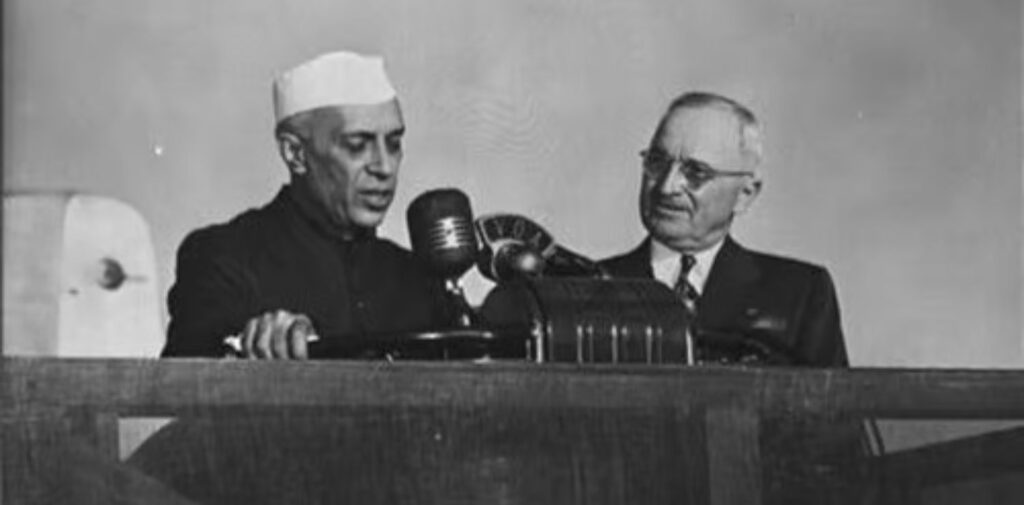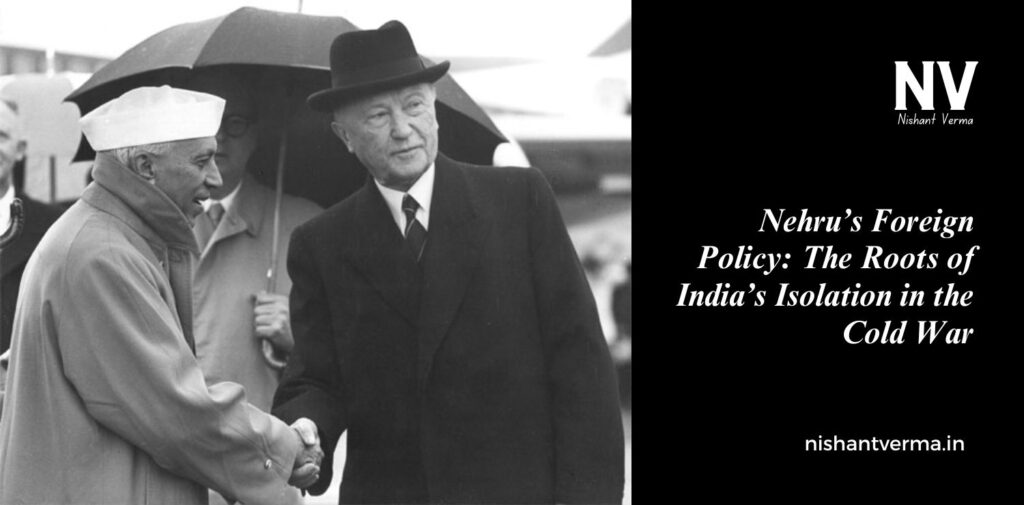When India gained independence in 1947, it faced numerous challenges, both at home and abroad. One of the most crucial tasks for the new country was shaping its foreign policy. Jawaharlal Nehru, India’s first Prime Minister, was the key architect of this policy. His vision for India’s role in the world was based on ideals of peace, non-alignment, and cooperation. However, despite Nehru’s strong desire to keep India away from the bitter divisions of the Cold War, his policies eventually led to India’s relative isolation on the global stage during this period. To understand how this happened, it’s essential to explore Nehru’s foreign policy, its objectives, and the challenges it faced.

Nehru’s Vision of Foreign Policy
Nehru’s foreign policy was deeply influenced by his idealism and moral philosophy. He believed that India should not be caught in the conflicts between the major powers of the Cold War — the United States and the Soviet Union. Instead, India should carve out a neutral path that emphasized peace, cooperation, and development. His policy was rooted in the belief that newly independent nations like India had the potential to lead the world in creating a fairer and more just global order.
Nehru’s vision was influenced by several factors:
- The Legacy of Colonialism: India had only just freed itself from British colonial rule. Nehru and other leaders were determined to avoid being drawn into new forms of imperialism, whether in the form of Western influence or the Soviet sphere. They wanted India to remain sovereign and independent in its dealings with the world.
- Non-Alignment: Nehru coined the term “Non-Alignment,” which became the cornerstone of India’s foreign policy. Non-alignment meant that India would not take sides in the Cold War, which was characterized by tensions between the US-led capitalist bloc and the Soviet-led communist bloc. Nehru believed that taking sides would limit India’s freedom to make independent decisions and hurt its relationships with other countries, especially the newly independent nations in Asia and Africa.
- Internationalism and Peace: Nehru was a strong advocate for global peace and believed that international cooperation was essential to solve the world’s problems. He supported the United Nations (UN) and believed in working with other countries to prevent conflicts and promote human rights.
- Economic Development: Nehru saw India’s future in terms of economic growth and industrialization. He believed that India’s foreign policy should be focused on gaining international support for its development needs, including access to resources, technology, and capital.

The Challenge of the Cold War
The Cold War, which started soon after the end of World War II, divided the world into two hostile camps. On one side were the United States and its allies, who supported capitalism and democracy. On the other side were the Soviet Union and its allies, who backed communism and totalitarianism. The rivalry between these two superpowers resulted in an ideological and military standoff that lasted for several decades.
India’s position in this global rivalry was challenging. While Nehru was committed to non-alignment, the reality of the Cold War often put him in difficult situations. The United States and the Soviet Union were both eager to win India’s support, but Nehru’s refusal to take sides made it hard for either superpower to fully trust or cooperate with India.
In addition to the Cold War rivalry, Nehru had to navigate India’s relationship with its neighbors, especially China and Pakistan. These relationships were also influenced by the larger global context and played a role in shaping India’s foreign policy.
The Roots of India’s Isolation
Although Nehru’s foreign policy was based on noble ideals, several factors led to India’s relative isolation during the Cold War. While India was able to maintain its independence in foreign relations, it also found itself excluded from key global decisions and partnerships.
- Neutrality Between Superpowers: Nehru’s commitment to non-alignment often placed India in an awkward position, especially when it came to international crises. For instance, during the Korean War (1950-1953), Nehru supported the UN’s peace efforts, but he did not align with either the US or the Soviet Union. This neutrality meant that India was not able to fully engage with either of the Cold War superpowers, limiting its ability to influence major international decisions.
- Relations with the United States: In the early years of independence, India’s relationship with the United States was somewhat cordial. However, Nehru’s refusal to join the Western bloc during the Cold War and his increasing alignment with the Soviet Union caused tensions with the US. The United States was wary of India’s neutral stance and, over time, grew critical of India’s refusal to side with the West. This led to a decline in the US-India relationship, especially after the 1950s.
- Relations with the Soviet Union: While Nehru’s non-alignment policy meant India did not formally take sides, he did develop a strong relationship with the Soviet Union, especially after the 1950s. India received economic and military aid from the Soviet Union, and the two countries shared common interests, such as opposing colonialism and supporting peace. However, this closeness to the Soviet Union contributed to the perception that India was leaning toward the communist bloc, which further strained its relations with the United States and other Western countries.
- The China Issue: The rise of Communist China under Mao Zedong in the 1940s and 1950s created new tensions for Nehru. Initially, India had hoped to have a friendly relationship with China, as both countries were newly independent and shared some common goals. However, the border dispute between India and China soon escalated, leading to the 1962 Sino-Indian War. This war was a major blow to India’s foreign policy, as it exposed India’s military weaknesses and undermined its position as a leader of the non-aligned movement. After the war, India’s global reputation was damaged, and it became more isolated from both China and the Western powers.
- The Pakistan Factor: India’s relationship with its neighbor Pakistan was another factor that influenced its foreign policy. The partition of India in 1947 had led to a bitter rivalry between the two countries, particularly over the Kashmir issue. While Nehru tried to resolve the Kashmir dispute through diplomacy, he was unable to gain international support for India’s position. Pakistan, supported by the United States, aligned itself with the Western bloc during the Cold War, which further isolated India from the global community.
- India’s Economic Struggles: Despite Nehru’s vision of economic growth, India’s economy struggled during the early years of independence. The country’s industrial base was weak, and its dependence on foreign aid was high. Nehru’s emphasis on self-reliance and avoiding economic dependency on the superpowers meant that India was not able to access the kind of financial assistance or technological support that other countries in the Cold War blocs received.

The Impact of Isolation
India’s relative isolation during the Cold War had several consequences. On one hand, it allowed India to maintain its independence and avoid being dragged into global conflicts. Nehru’s commitment to non-alignment also helped to establish India as a leader of the newly independent nations in Asia and Africa, who sought a third path away from the Cold War divisions.
On the other hand, India’s isolation also meant that it struggled to secure crucial international support in areas such as defense, economic development, and technology. The lack of close ties with either of the superpowers also meant that India was often left out of key international decisions. This isolation became more pronounced after Nehru’s death in 1964, as India’s foreign policy shifted under subsequent leaders.
Conclusion
Nehru’s foreign policy was based on the ideals of peace, non-alignment, and cooperation. While his vision was rooted in the desire for a just and independent India, his approach ultimately led to the country’s relative isolation during the Cold War. India’s refusal to align with either the United States or the Soviet Union, combined with its strained relations with China and Pakistan, meant that India was often left on the sidelines in global affairs. However, Nehru’s policy of non-alignment also allowed India to maintain its sovereignty and avoid being drawn into the Cold War conflicts. The roots of India’s isolation in the Cold War were deep and complex, but they were also shaped by Nehru’s idealism and vision for a peaceful world order.




